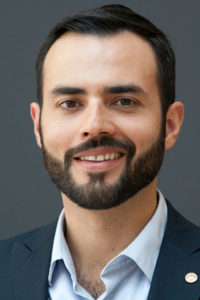
Health equity is very personal to Luis A. Rodriguez, PhD, MPH, RD. When he was in college, one of his Latino roommates was diagnosed with type 2 diabetes. That roommate had been homeless at times, had faced food insecurity, and was underinsured most of his life. Today, these life circumstances are called “social determinants of health.”
“I saw that these factors left him pretty unequipped to be able to prevent or manage his diabetes once he developed it,” said Rodriguez, T32 Diabetes Translational Research Fellow, Kaiser Permanente Northern California. “I often think about him and how what we’re doing now for people with prediabetes might have benefited him.”
Dr. Rodriguez will discuss the use of peer support to enhance type 2 diabetes prevention among African American and Latino adults on Friday, June 3, during the session Translational Science to Promote Health Equity and Address Social Determinants of Health in Diabetes Prevention and Care. The two-hour session, which will be livestreamed for virtual attendees, begins at 2:00 p.m. CT in La Nouvelle Orleans Ballroom B at the convention center.
Dr. Rodriguez will present data from the Using Peer Support to Aid in Prevention and Treatment in Prediabetes (UPSTART) study. In the study, African American and Latino patients faced more barriers related to social determinants of health than other study groups. But evidence shows that peer support helps patients with type 2 diabetes manage their condition despite those barriers, Dr. Rodriguez said.
“Peer-coach interventions work because they are individuals who have lived experience, because they also have had prediabetes at some point,” he explained. “They know how difficult it can be to make necessary lifestyle changes. Patients, especially underserved patients, often need somebody who they can communicate with, who is on the same level as them, and who actually has lived the experience and speaks the same language.”
In the UPSTART study, primary care physicians selected peer coaches among their prediabetes patients who had been successful at making lifestyle changes that lowered their blood glucose levels in the past 12 months.
“They were also really proud of what they had accomplished and were motivated to help others in their communities achieve the same success that they had,” Dr. Rodriguez said.

Another session speaker, Deborah A. Ellis, PhD, will discuss the use of translational interventions and implementation science to address disparities in ethnic minority youth with type 1 diabetes. Dr. Ellis, Professor of Family Medicine and Public Health Sciences, Wayne State University School of Medicine, is a pediatric psychologist.
“There aren’t enough specialists like me to go around when it comes to the behavioral health of children with diabetes,” she said. “When we’re talking about teenagers, we all know that diabetes management is even more of a challenge. So, we talk a lot about the importance of family and family management. Psychologists tend to be involved in developing those interventions because one of our specialties is helping families work together. Adolescents tend to struggle more with their management anyway, and then we also know that there are these additional barriers to optimizing diabetes management for Black youth.”
Dr. Ellis will present results from a multicenter clinical trial of African American youth with type 1 diabetes. Little to no work has been done to develop culturally tailored interventions for these patients, she said.
“Black youth tend to have suboptimal glycemic control and they are less likely to be able to access advanced diabetes treatment technologies like continuous glucose monitors or insulin pumps,” she said.
Dr. Ellis will discuss how she’s using implementation science to improve routine clinical care for ethnic minority youth.
“Our eHealth intervention is actually a family intervention,” she said. “It gives parents advice about how to help their teen manage their diabetes, encouraging optimal family management but is tailored for Black families.”
Debra Haire-Joshu, PhD, Director of the Center for Diabetes Translation Research and the Center for Obesity Prevention and Policy Research, Washington University, will open the session with an introductory discussion about using diabetes translation to achieve health equity. Kathryn E. Gunter, MSW, MPH, Deputy Director of the National Program Office for the Bridging the Gap: Reducing Disparities in Diabetes Care Initiative, University of Chicago, will address structural and social inequities in diabetes care. And Gregory Talavera, MD, MPH, Professor of Behavioral Medicine, San Diego State University, will discuss translational interventions for type 2 diabetes management among underserved Hispanics/Latinos.
[sub-post-content]